List of forts in Pakistan
The following is a partial list of forts and castles in Pakistan:
| Name | Location | Province/Region | Date of Completion | Ownership / Built by | Image | Notes |
|---|---|---|---|---|---|---|
| Sharda Castle[1] | Sharda, Neelam District | Kashmir | ||||
| Throtchi Castle | Kotli District | Kashmir | 1460 | |||
| Baghsar Fort[2] | Samahni Valley, Bhimber | Kashmir | Mughal Empire[3] | 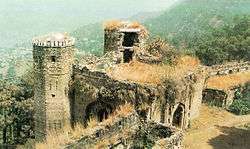 |
Currently closed to visitors, due to it being right beside Line of Control between Pakistan and India. | |
| Ramkot Fort | Mirpur | Kashmir | 16–17th Century | Gakhars | ||
| Kargai Fort | Khuiratta, Kotli District | Kashmir | Also spelled as Karjai Fort. | |||
| Red Fort, Muzaffarabad | Muzaffarabad | Kashmir | 1646 | Sultan Muzaffar Khan | 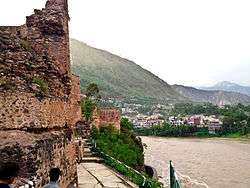 |
Locally, it is known as the "Rutta Qila" or just "qila". |
| Quetta Fort[4] | Quetta | Balochistan | 1867 | British Raj | Also known as Sandeman Fort. | |
| Kalat Fort[5] | Kalat | Balochistan | The town of Kalat is said to have been founded by and named Qalat-e Sewa (Sewa's Fort), after Sewa, a legendary hero of the Baloch people. | |||
| Punno Fort[6] | Turbat | Balochistan | Also known as "Meeri Kalaat". Location 26°2′2″N 63°00′46″E / 26.03389°N 63.01278°E | |||
| Fort Munro | D.G.Khan | Punjab Pakistan | 1800 | John Munro, 9th of Teaninich | 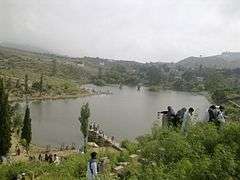 |
Locally, it is known as the "South Punjab Murree". |
| Mir Chakar Fort[7] | Sibi | Balochistan | ||||
| Baltit Fort | Hunza Valley | Gilgit-Baltistan | Since 2004, it has been on the UNESCO World Heritage Tentative list. | |||
| Skardu Fort | Skardu | Gilgit-Baltistan | ||||
| Altit Fort | Altit, Hunza Valley | Gilgit-Baltistan | 11th Century | 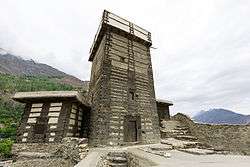 |
||
| Shigar Fort | Shigar | Gilgit-Baltistan | 17th Century | Amacha Dynasty | The Shigar Fort means The Fort on Rock. | |
| Khaplu Fort | Khaplu, Ghanche District | Gilgit-Baltistan |  |
It is locally known as Yabgo Khar, meaning "The fort on the roof". | ||
| Kalam Darchi Fort | Misgar Valley, Gojal | Gilgit-Baltistan | 1933 | British Raj | This fort was named after a naked saint and was built by British soldiers during 1932-33 to check the invasion and inflow of people from China and USSR through Wahkan corridor. It remained the abode of Gilgit Scouts.[8] | |
| Bala Hisar Fort | Peshawar | Khyber Pakhtunkhwa | also known as Qila Balahisar | |||
| Chitral Fort[9] | Chitral | Khyber Pakhtunkhwa | 35°51′19″N 71°47′30″E / 35.85528°N 71.79167°E | |||
| Mastuj Fort[10] | Mastuj | Khyber Pakhtunkhwa | ||||
| Drosh Fort | Chitral | Khyber Pakhtunkhwa | ||||
| Chakdarra Fort[11] | Lower Dir District | Khyber Pakhtunkhwa | 1586 | Mughal Empire | The Mughals built a fort here in 1586, occupied in 1895 by the British, who built the present fort in 1896. 34°38′50″N 72°01′42″E / 34.64722°N 72.02833°E | |
| Malakand Fort | Malakand District | Khyber Pakhtunkhwa | ||||
| Handyside Fort | Kohat | Khyber Pakhtunkhwa | British Raj | |||
| Attock Fort | Attock Khurd, Attock | Punjab | 1583 | Mughal Emperor Akbar | 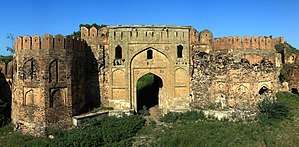 |
Attock Fort was built at Attock Khurd during the reign of Akbar the Great from 1581 to 1583 under the supervision of Khawaja Shamsuddin Khawafi to protect the passage of the River Indus. |
| Rohtas Fort | Jhelum | Punjab | 16th Century | Sher Shah Suri | 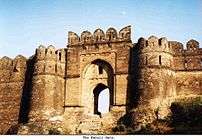 |
|
| Derawar Fort | Bahawalpur | Punjab | Rajput |  |
||
| Lahore Fort | Lahore | Punjab | 1605 | Mughal Emperor Akbar |  |
|
| Noor Mahal | Bahawalpur | Punjab | 1875 | Nawab Sadiq Muhammad Khan IV |  |
|
| Sadiq Garh Palace[12] | Bahawalpur | Punjab | ||||
| Darbar Mahal[13] | Bahawalpur | Punjab | ||||
| Pharwala Castle | Rawalpindi | Punjab | 15th Century | Gakhars | ||
| Sheikhupura Fort[14] | Sheikhupura | Punjab | 1607 | Mughal Emperor Jahangir | 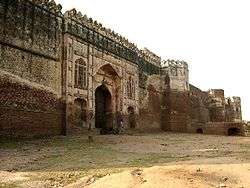 |
|
| Multan Fort | Multan | Punjab | 800 - 1000 BC | The fort was destroyed by British forces. | ||
| Mankera Fort | Mankera, Bhakkar District | Punjab | ||||
| Meer Garh Fort | Meer Garh | Punjab | 29°10′26″N 72°37′15″E / 29.17389°N 72.62083°E | |||
| Marot Fort | Marot | Punjab | [15] | A ruined fortress town. 29°10′37″N 72°26′00″E / 29.17694°N 72.43333°E | ||
| Fort Abbas | Fort Abbas Tehsil, Bahawalnagar District | Punjab | ||||
| Bavaani Fort | Sahiwal | Punjab | ||||
| Shujabad Fort | Shujabad | Punjab | ||||
| Nandana Fort | Chakwal | Punjab |  |
Al-Beruni (973-1053 AD), the celebrated traveler, historian, philosopher, mathematician, astronomer and scientist, came to the subcontinent in the period of Mehmood of Ghazni during the 11th century. It was at Nandana, that he measured the circumference of the earth.[16] | ||
| Satghara | Okara District | Punjab | It is also believed to be the location of the tomb of Baloch king, Mir Chakar Rind (1468–1565). | |||
| Kot Diji Fort | Kot Diji, Khairpur District | Sindh | 1795 | Mir Sohrab Khan Talpur |  |
|
| Ranikot Fort | Jamshoro District | Sindh | 17th Century | 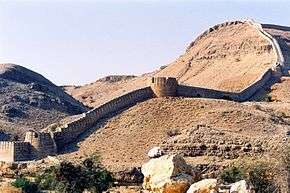 |
Ranikot Fort is also known as The Great Wall of Sindh and is believed to be the world's largest fort with a circumference of approximately 26 kilometres (16 mi).[17] Since 1993, it has been on the tentative list of UNESCO World Heritage Sites.[18] | |
| Naukot Fort | Tharparkar | Sindh |  |
|||
| Fort Naukot | Naukot | Sindh |  |
24°50′42″N 69°26′59″E / 24.84500°N 69.44972°E | ||
| Bhakar Fort | Sukkur | Sindh | 27°41′46″N 68°53′3″E / 27.69611°N 68.88417°E | |||
| Sehwan Fort | Sehwan Sharif | Sindh | ||||
| Mohatta Palace | Karachi | Sindh | 1927 | Shivratan Chandraratan Mohatta | ||
| Faiz Mahal | Khairpur | Sindh | 1798 | Talpurs |  |
|
| Qasim fort | Karachi | Sindh | 18th Century CE | Talpur dynasty | ||
| Pacco Qillo | Hyderabad | Sindh | 1768 | Mian Ghulam Shah Kalhoro | ||
| Umerkot Fort | Umerkot | Sindh | Mughal Empire | |||
| Kadiro Fort | Sindh | |||||
| Rawat Fort | Islamabad | Islamabad Capital Territory | Gakhars | |||
| Jamrud Fort | Jamrud, Khyber Agency | Federally Administered Tribal Areas | 1836 | Hari Singh Nalwa | ||
| Miranshah Fort | Miranshah, North Waziristan | Federally Administered Tribal Areas | ||||
| Wana Fort | Wana, Pakistan, South Waziristan | Federally Administered Tribal Areas | ||||
| Ali Masjid Fort | Khyber Agency | Federally Administrated Tribal Areas | 1837 | Dost Mohammad Khan | 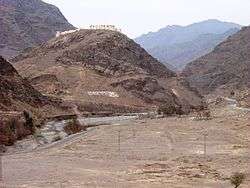 |
|
| Islam Garh Fort | 1665 | Raja Rawal Siri Bheem Singh | [19] | |||
| Moj Garh Fort | ||||||
| Bijnot Fort | ||||||
| Deen Garh Fort | [20] | |||||
| Khair Garh Fort | ||||||
| Nawan Kot Fort | ||||||
| Jaam Garh Fort | ||||||
| Khan Garh Fort |
See also
- List of UNESCO World Heritage Sites in Pakistan
- List of museums in Pakistan
- Lahore Fort
- Rohtas Fort
- Noor Mahal
- Derawar Fort
References
- ↑ "Sharda Castle, Azad Kashmir".
- ↑ "SAMAHNI VALLEY BHIMBER AZAD KASHMIR".
- ↑ Pakistan and the Karakoram Highway, p. 186
- ↑ "Quetta".
- ↑ "Kalat Fort".
- ↑ Pannu Fort Balochistan, Pakistan
- ↑ The Historic Mir Chakar Khan Fort
- ↑ Forts of Gilgit-Baltistan
- ↑ "Chitral Fort".
- ↑ http://www.hindukush.com.pk/index.php/mastij-fort
- ↑ "Forts of Pashtunkhwa".
- ↑ "My Bahawalpur".
- ↑ "The Bahawalpur Photo Gallery".
- ↑ "Sheikhupura Fort".
- ↑ http://pk.worldmapz.com/photo/16204_fr.htm
- ↑ Nandana Fort
- ↑ Ondaatje, Christopher (May 1996). Sindh revisited: a journey in the footsteps of Captain Sir Richard Burton : 1842-1849, the India years. HarperCollins Publishers. p. 265. ISBN 978-0-00-255436-7.
- ↑ "Ranikot Fort". UNESCO. Retrieved 20 November 2013.
- ↑ Iqbal, Shahid (28 March 2002). "Islam Garh Fort out of sorts". DAWN.COM. RAHIM YAR KHAN. Retrieved 19 May 2017.
- ↑ "Documentry on Qila Deen Garh". Radio Pakistan. 30 May 2016. Retrieved 22 May 2017.
External links
| Wikimedia Commons has media related to Forts in Pakistan. |
External links
This article is issued from
Wikipedia.
The text is licensed under Creative Commons - Attribution - Sharealike.
Additional terms may apply for the media files.